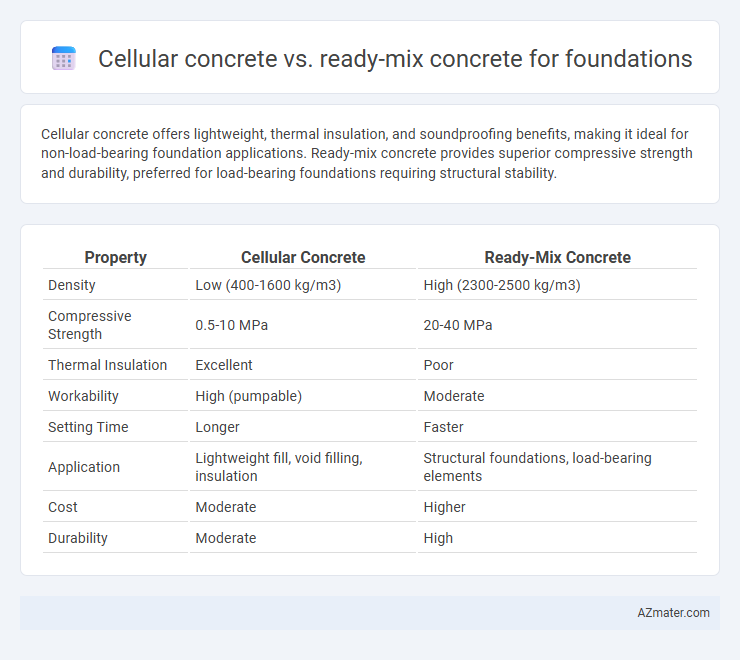Cellular concrete offers lightweight, thermal insulation, and soundproofing benefits, making it ideal for non-load-bearing foundation applications. Ready-mix concrete provides superior compressive strength and durability, preferred for load-bearing foundations requiring structural stability.
Table of Comparison
| Property | Cellular Concrete | Ready-Mix Concrete |
|---|---|---|
| Density | Low (400-1600 kg/m3) | High (2300-2500 kg/m3) |
| Compressive Strength | 0.5-10 MPa | 20-40 MPa |
| Thermal Insulation | Excellent | Poor |
| Workability | High (pumpable) | Moderate |
| Setting Time | Longer | Faster |
| Application | Lightweight fill, void filling, insulation | Structural foundations, load-bearing elements |
| Cost | Moderate | Higher |
| Durability | Moderate | High |
Introduction to Foundation Construction Materials
Cellular concrete offers lightweight properties and excellent thermal insulation, making it ideal for foundation applications requiring reduced load and improved energy efficiency. Ready-mix concrete provides high compressive strength and durability with consistent quality, suitable for standard foundation structures exposed to heavy loads. Selecting between cellular and ready-mix concrete depends on project-specific requirements such as load-bearing capacity, soil conditions, and construction speed.
What is Cellular Concrete?
Cellular concrete is a lightweight, porous material composed of cement, water, and pre-formed foam that creates numerous air-filled voids, significantly reducing its density compared to traditional concrete. Its unique structure provides excellent thermal insulation, sound absorption, and enhanced drainage, making it suitable for non-structural foundation applications such as void filling and soil stabilization. In contrast, ready-mix concrete is a dense, conventional mixture designed for high compressive strength and structural integrity in load-bearing foundations.
Understanding Ready-Mix Concrete
Ready-mix concrete is a pre-mixed blend of cement, aggregates, water, and admixtures tailored at batching plants to meet specific strength and durability requirements for foundation construction. It ensures consistent quality control, reduces on-site labor, and accelerates project timelines compared to cellular concrete, which is lightweight and less dense but offers superior thermal insulation. Understanding these properties helps developers choose ready-mix concrete for its structural strength and reliability in load-bearing foundation applications.
Key Material Properties Comparison
Cellular concrete offers lower density and enhanced thermal insulation compared to ready-mix concrete, making it suitable for specific foundation applications requiring lightweight and energy efficiency. Ready-mix concrete provides higher compressive strength and durability, essential for structural stability and load-bearing capacity in foundational work. The porosity and air content in cellular concrete reduce its strength but improve workability, while ready-mix concrete's homogeneous mix ensures consistent strength and durability for long-term performance.
Structural Strength and Load-Bearing Capacity
Cellular concrete exhibits lower structural strength and load-bearing capacity compared to ready-mix concrete, making it less suitable for heavy foundation loads. Ready-mix concrete offers higher compressive strength, typically ranging from 20 to 40 MPa, ensuring robust support for structural foundations. The density and air-void content in cellular concrete reduce its load-bearing capacity, whereas ready-mix concrete's optimized mix design delivers superior durability and stability in foundation applications.
Thermal and Sound Insulation Performance
Cellular concrete offers superior thermal insulation due to its porous structure, significantly reducing heat transfer compared to dense ready-mix concrete, which enhances energy efficiency in foundation applications. Sound insulation is also improved with cellular concrete, as its air voids effectively dampen noise transmission, unlike ready-mix concrete that typically conducts sound more readily. These properties make cellular concrete a preferred material for foundations in environments requiring enhanced thermal regulation and acoustical comfort.
Installation Process and Construction Speed
Cellular concrete offers a lightweight, easy-to-pump and pour installation process, significantly reducing labor time and allowing faster curing compared to dense ready-mix concrete. Ready-mix concrete requires heavier machinery for placement, often involving more labor-intensive preparation and longer setting times, which can slow down the construction schedule. The faster installation and early strength gain of cellular concrete enable quicker foundation completion, improving overall project timelines.
Cost Analysis: Cellular vs Ready-Mix Concrete
Cellular concrete offers significant cost savings for foundations due to its lightweight nature, requiring less material and reducing transportation and labor expenses compared to ready-mix concrete. Ready-mix concrete typically incurs higher costs driven by raw material prices, batching, and the need for heavy machinery during placement. The overall cost differential depends on project scale and site accessibility, with cellular concrete often proving more economical for large or complex foundation projects.
Environmental Impact and Sustainability
Cellular concrete offers significant environmental benefits over ready-mix concrete for foundations due to its lower density, which reduces the consumption of raw materials and energy during production. Its thermal insulation properties improve building energy efficiency, decreasing long-term environmental impact by minimizing heating and cooling demands. Ready-mix concrete, while widely used, typically involves higher greenhouse gas emissions from cement production and greater resource extraction, making cellular concrete a more sustainable choice for eco-friendly construction.
Best Use Cases for Each Concrete Type
Cellular concrete offers excellent thermal insulation and lightweight properties, making it ideal for foundation backfills, void filling, and situations requiring reduced dead load. Ready-mix concrete provides superior compressive strength and durability, suited for load-bearing foundations and structural elements exposed to heavy loads or harsh environmental conditions. Choosing cellular concrete benefits projects emphasizing energy efficiency and rapid installation, while ready-mix concrete is preferred for high-strength foundational support.

Infographic: Cellular concrete vs Ready-mix concrete for Foundation
 azmater.com
azmater.com